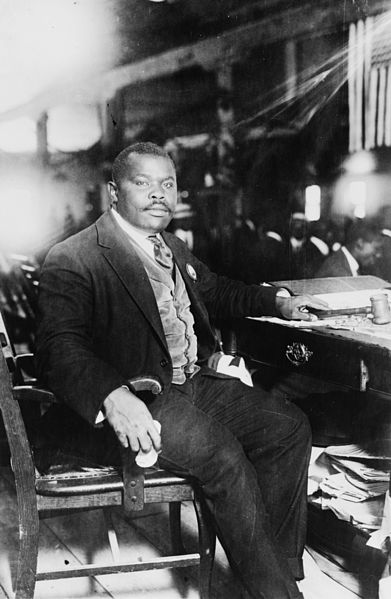Ahead of Birkbeck’s 200th anniversary, Professor Joanna Bourke explores the history of the College in this blog series, starting with a look at Jamaican political activist, Black Nationalist and Pan-Africanist Marcus Garvey’s time at Birkbeck.
 Birkbeck has always been a diverse community. In the 1910s, one of our students was the Jamaican revolutionary Marcus Garvey, who later co-founded (with Pan-Africanist Amy Ashwood) the Universal Negro Improvement and Conservation Association and African Communities League.
Birkbeck has always been a diverse community. In the 1910s, one of our students was the Jamaican revolutionary Marcus Garvey, who later co-founded (with Pan-Africanist Amy Ashwood) the Universal Negro Improvement and Conservation Association and African Communities League.
In 1912, 25-year-old Garvey stepped off the boat at Southampton docks. He had just arrived from Jamaica. According to the census of 1911, there were only 4,540 “Africans” (which included West Indians) living in the United Kingdom at the time. Garvey, who had just begun thinking seriously about issues of identity and race, spent the next two years travelling about the UK. His base, however, was London where, between 1912 and 1914, he attended classes in law and philosophy at Birkbeck.
He always looked back at his time in the College with fondness. His time in London had been enriched by meeting Dusé Mohammed Ali, a Sudanese-Egyptian, who worked as a journalist and stage actor but also wrote In the Land of the Pharaohs. It was Ali who vouched for Garvey’s honesty when he applied for a readers’ ticket admitting him into the rotunda of the British Library. This was where Garvey first read Booker T. Washington’s Up From Slavery. As he later recalled, this book made him realise his “doom – if I may so call it”: the possibility “of being a race leader dawned on me”.
Garvey was a keen and vocal Birkbeck student; he could occasionally also be heard haranguing crowds at Hyde Park’s “Speakers’ Corner” and supporters could read his articles in the African Times and Orient Review. In the Review’s October 1913 edition, Garvey contended that the British West Indies was “the Mirror of Civilization” and he saluted “History Making by Colonial Negroes” as an achievement that should be celebrated. His time at Birkbeck was revelatory. He asked himself:
“where is the black man’s Government? Where is his King and his kingdom? where is his President, his country, and his ambassador, his army, his navy, his men of big affairs?”
When he realised that he “could not find them”, he contended that he had a duty to “help to make them”. On 17 June 1914, he boarded the SS Trent as one of only three third-class passengers and made his way back to Jamaica. During the month-long voyage, he had time to reflect on what he had learnt at Birkbeck and in the UK. Five days after arriving back in Jamaica, the Universal Negro Improvement and Conservation Association and African Communities League was born.
Throughout his life, Garvey spoke warmly about his time at Birkbeck. His affection was not dented even after he discovered that, in the early 1930s, the College had (briefly) employed Sir Fiennes Barrett-Lennard as a lecturer. In 1929, when Sir Fiennes had been Chief Justice of Jamaica, he had not only imprisoned Garvey for contempt of court but had also confiscated the property of the Universal Negro Improvement Association. Garvey was later to sardonically observe that there seemed to be:
“a kind of inseparable relationship between us and the ex-Chief [that is, Sir Fiennes as Chief Justice of Jamaica]. By goodness, he is to be connected to our Alma Mater. Little did we believe twenty years ago that Sir Fiennes would have become a member of the faculty of the College where we spent a little time.”
Garvey admitted that he would “feel very much embarrassed on a visit to England” if, while attending a graduation at Birkbeck, he discovered that the former Chief Justice was “the guest of the evening”. Garvey need not have worried: Sir Fiennes was marginal in the College and was certainly never invited to speak at any official ceremony. Despite his disappointment in Birkbeck’s choice of lecturer, Garvey insisted that the “tradition of Birkbeck College is one that every student can be proud of”.
Joanna Bourke, Professor of History, is writing a history of Birkbeck for publication during the College’s 200th anniversary in 2023. Joanna is also the Gresham Professor of Rhetoric (London) and you can find out more about her Gresham College public lecture series at https://www.gresham.ac.uk/series/exploring-the-body/

Students are learning about Sir Marcus Garvey, an amazing historical figure, who achieved so much more than many realize. I was pleased to know that many people of all races, acknowledged Sir Marcus…, for his ground breaking works. I wish to visit the college with a student who wishes to see papers/documentation or anything remaining that shows how Sir Marcus spent his time at Birkbeck. The student is doing a Project about Sir Marcus Garvey. Thanks for sharing this article. Anna